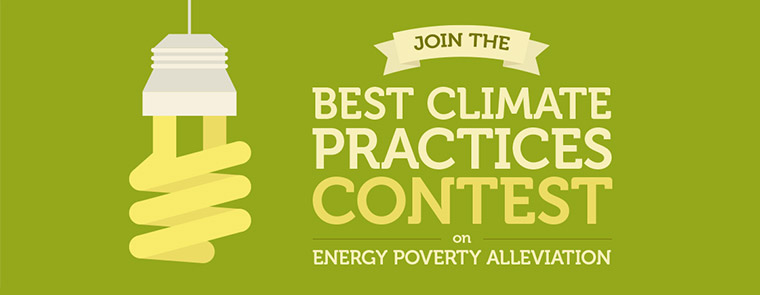2014 Best Climate Practices Award on “Energy Poverty Alleviation”

Note: This is an older edition of the Best Climate Practices Award. All information about the current edition of the contest is available on the Award Section of this website.
2014 Theme: “Energy poverty alleviation”
Currently, 1.3 billion people – one on five globally – have no access to electricity and energy infrastructures with adequate standards of quality and efficiency. Besides the effect on the environment, climate change and human health, due to the lack of clean cooking and heating facilities, energy poverty is responsible to aggravate the status of extreme indigence in which a large extent of world’s population relies on. The right actions can lead to win-win situations that combine climate change mitigation/adaptation actions and socio-economic development. Best Climate Practices can
Read the full Best Climate Practices 2014 Call for proposals
Key dates
Competition’s start date
July 10, 2014
Competition’s end date
October 31, 2014
Winners announcement
December 13, 2014
2014 Panel of Experts
Carlo Carraro
Carlo Carraro is Professor of Environmental Economics at the Ca’ Foscari University of Venice. He holds a Ph.D. from Princeton University. He has been President of the University of Venice from 2009 to 2014 and Director of the Department of Economics from 2005 to 2008. In 2008, he was elected Vice-Chair of the Working Group III and Member of the Bureau of the Nobel Laureate Intergovernmental Panel on Climate Change (IPCC). He has been re-elected in 2015 for a second term.
Pippo Ranci
President of the World Access to Modern Energy & EXPO2015 Association. He has been the first President of the Italian Regulatory Authority for Electricity and Gas, Vice President of the Council of European Energy Regulators and the first Director of the Florence School of Regulation at the Robert Schuman Centre of the European University Institute in Florence.
Shonali Pachauri
Senior researcher scholar in the Energy Program at the International Institute for Applied Systems Analysis (IIASA). She recently served on the Executive Committee of the Global Energy Assessment and was Convening Lead Author for the chapter on Energy Access for Development. Her research over the last decade has focused on the socio-economic, demographic and environmental dimensions of household energy use in the developing world.
Saleemul Huq
Director of the Climate Change Program at the International Institute for Environment and Development (IIED). First Executive Director of the Bangladesh Centre for Advanced Studies in Dhaka. Academic visitor at the T.H Huxley School of Environment at the Imperial College in London, where he teaches a course on global environmental policies.
Raffaella Centurelli
Policy Advisor in the Cabinet of the Secretary-General at the Organisation for Economic Cooperation and Development (OECD). She works on G20 and G8 related issues. Prior to this role, she worked as an energy analyst at the International Energy Agency (IEA) for several years where she was responsible for the Energy and Poverty study carried out by the World Energy Outlook (WEO) team.
2014 Winners and Awards
The 2014 Best Climate Practices contest features two awards: the Experts’ Choice Award and the Users’ Choice Award. The Experts’ Choice Award winners receive a valuable artistic Murano Glass sculpture created by a Murano Master. The Users’ Choice Award is voted on by the public through the BCP website, involving a quantitative voting system. The Users’ Choice Award winners are awarded
The winner of the Experts’ Choice Award is the “Solar Powered Floating Schools” project.
Solar Powered Floating Schools is a project based in Bangladesh where heavy monsoon rain and seasonal flooding severely impact people’s ability to access resources. These schools use solar powered devices as a sustainable way of powering their educational practices. This practice was chosen by the Experts Panel for its ability to increase access to energy-dependent services in an energy poor location. It was also selected for being a climate change adaptation strategy: climate change is exacerbating flooding problems in Bangladesh. These floating schools are providing solutions to the increasing problem posed by floodings. Projects to address energy poverty are often GHG mitigation measures. The Solar Powered Floating Schools are also adaptation tools.
The “upOwa” practice received the highest number of votes on the Contest’s website, and therefore wins the Users’ Choice Award: a promotional video of the project to help disseminating this idea.
upOwa addresses the increasing demand for energy in African nations that is not being met by current grid systems. The project plans to develop and operate smart solar systems that power lights and appliances in African villages that are not connected to the national grid. The first pilot is scheduled to be implemented in Cameroon in 2015. The pay-as-you-go model allows homes to access energy without high upfront costs and without the time-consuming travel that previous methods demanded. upOwa was selected by users because of its feasibility, replicability, originality and impact on reducing energy poverty.
The winners are officially awarded at the Think Forward Film Festival in Venice, Italy on the 12-13 December 2014.

